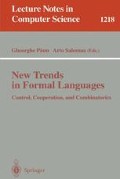Abstract
The study of teams in grammar systems so far has evolved around teams being formed from a finite number of sets of context-free productions. Here, the generative power of teams in grammar systems consisting of regular, linear and metalinear sets of productions is investigated.
For these sub-context-free cases the forming of teams strictly increases the generative power of the underlying grammar systems in many cases.
This research was supported by a scholarship from the Hungarian Ministry of Culture and Education. Moreover, the facilities provided by the Department of General Computer Science of the Eötvös Loránd University and in particular by the Computer and Automation Research Institute of the Hungarian Academy of Sciences were essential.
Preview
Unable to display preview. Download preview PDF.
References
M. H. ter Beek, Teams in grammar systems, IR-96-32 (master's thesis), Leiden University, 1996.
M. H. ter Beek, Teams in grammar systems: hybridity and weak rewriting. To appear in Proceedings Workshop Grammar Systems: Recent Results and Perspectives, Budapest, 26–27 July 1996.
E. Csuhaj-Varjú and J. Dassow, On cooperating distributed grammar systems. J. Inf. Process. Cybern. EIK 26 (1990), 49–63.
E. Csuhaj-Varjú, J. Dassow, J. Kelemen and Gh. Păun, Grammar Systems. A Grammatical Approach to Distribution and Cooperation, Gordon and Breach, London, 1994.
E. Csuhaj-Varjú and J. Kelemen, Cooperating grammar systems: a syntactical framework for the blackboard model of problem solving. In Proc. AI and information-control systems of robots '89 (I. Plander, ed.), North-Holland Publ. Co., 1989, 121–127.
E. Csuhaj-Varjú and Gh. Păun, Limiting the size of teams in cooperating grammar systems. Bulletin EATCS 51 (1993), 198–202.
E. Csuhaj-Varjú, Eco-grammar systems: recent results and perspectives. In [18] (1995), 79–103.
J. Dassow, Cooperating grammar systems (definitions, basic results, open problems). In [18] (1995), 40–52.
J. Dassow and Gh. Păun, Regulated Rewriting in Formal Language Theory, Springer-Verlag, 1989.
J. Dassow and Gh. Păun, Cooperating distributed grammar systems with regular components. Computers and AI (1992).
R. Freund and Gh. Păun, A variant of team cooperation in grammar systems. J. UCS 1, 2 (1995), 105–130.
O. H. Ibarra, Simple matrix languages. Inform. Control 17 (1970), 359–394.
L. Kari, A. Mateescu, Gh. Păun and A. Salomaa, Teams in cooperating grammar systems, J. Exper. Th. AI 7 (1995), 347–359.
O. Mayer, Some restricted devices for context-free languages. Inform. Control 20 (1972), 69–92.
V. Mitrana, Hybrid cooperating distributed grammar systems. Computers and AI 2 (1993), 83–88.
Gh. Păun, On eliminating the λ-rules from simple matrix grammars. Fundamenta Informaticae 4 (1981), 185–195.
Gh. Păun, Grammar systems: a grammatical approach to distribution and cooperation. In Automata, Languages and Programming; 22nd International Colloquium, ICALP'95, Szeged, Hungary, Lecture Notes in Computer Science 944 (1995), 429–443.
Gh. Păun, ed., Artificial Life: Grammatical Models, Black Sea Univ. Press, Bucharest, Romania, 1995.
Gh. Păun and G. Rozenberg, Prescribed teams of grammars. Acta Informatica 31 (1994), 525–537.
D. J. Rosenkrantz, Programmed grammars and classes of formal languages. J. ACM 16, 1 (1969), 107–131.
G. Rozenberg and A. Salomaa, The Mathematical Theory of L Systems, Academic Press, New York, 1980.
A. Salomaa, Formal Languages, Academic Press, New York, 1973.
Author information
Authors and Affiliations
Editor information
Rights and permissions
Copyright information
© 1997 Springer-Verlag Berlin Heidelberg
About this chapter
Cite this chapter
ter Beek, M.H. (1997). Teams in grammar systems: Sub-context-free cases. In: Păun, G., Salomaa, A. (eds) New Trends in Formal Languages. Lecture Notes in Computer Science, vol 1218. Springer, Berlin, Heidelberg. https://doi.org/10.1007/3-540-62844-4_13
Download citation
DOI: https://doi.org/10.1007/3-540-62844-4_13
Published:
Publisher Name: Springer, Berlin, Heidelberg
Print ISBN: 978-3-540-62844-6
Online ISBN: 978-3-540-68703-0
eBook Packages: Springer Book Archive

